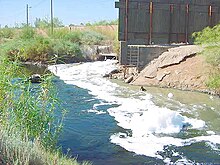Environmental issues: Difference between revisions
m vandalism |
merge |
||
| Line 1: | Line 1: | ||
{{Merge|Environmental degradation|date=September 2009}} |
|||
[[File:Nrborderborderentrythreecolorsmay05-1-.JPG|right|thumb|[[Water pollution]] is an environmental issue that affects many water bodies. This photograph shows foam on the [[New River (Mexico – United States)|New River]] as it enters the United States from Mexico.]] |
[[File:Nrborderborderentrythreecolorsmay05-1-.JPG|right|thumb|[[Water pollution]] is an environmental issue that affects many water bodies. This photograph shows foam on the [[New River (Mexico – United States)|New River]] as it enters the United States from Mexico.]] |
||
An '''environmental issue''' is the negative aspects of human activity on the [[environment (biophysical)|biophysical environment]]. [[Environmentalism]], a [[social movement|social]] and [[environmental movement]] that started in the 1960s, focuses on addressing environmental issues through advocacy, education and activism. |
An '''environmental issue''' is the negative aspects of human activity on the [[environment (biophysical)|biophysical environment]]. [[Environmentalism]], a [[social movement|social]] and [[environmental movement]] that started in the 1960s, focuses on addressing environmental issues through advocacy, education and activism. |
||
Revision as of 09:34, 25 September 2009
It has been suggested that this article be merged with Environmental degradation. (Discuss) Proposed since September 2009. |

An environmental issue is the negative aspects of human activity on the biophysical environment. Environmentalism, a social and environmental movement that started in the 1960s, focuses on addressing environmental issues through advocacy, education and activism.
Types of issues
Major current environmental issues are climate change, pollution and resource depletion. The conservation movement lobbies for protection of endangered species and protection of any ecologically valuable natural areas.
Scientific grounding
The level of understanding of Earth has increased markedly in recent times through science especially with the application of the scientific method. Environmental science is now a multi-disciplinary academic study taught and researched at many universities. This is used as a basis for addressing environmental issues.
Large amounts of data has been gathered and these are collated into reports, of which a common type is the State of the Environment publications. A recent major report was the Millennium Ecosystem Assessment, with input from 1200 scientists and released in 2005, which showed the high level of impact that humans are having on ecosystem services.
Environmental organisations
Environmental issues are addressed at a regional, nation or international level by government organisations.
The largest international agency, set up in 1972, is the United Nations Environment Programme. The International Union for Conservation of Nature brings together 83 states, 108 government agencies, 766 Non-governmental organizations and 81 international organizations and about 10,000 experts and scientists from countries around the world.[1]. International non-governmental organizations include Greenpeace, Friends of the Earth and World Wide Fund for Nature. Governments enact environmental policy and enforce environmental law and this is done to differing degrees around the world.
Solving environmental issues
Sustainability is the key to preventing or reducing the effect of environmental issues. There is now clear scientific evidence that humanity is living unsustainably, and that an unprecedented collective effort is needed to return human use of natural resources to within sustainable limits.[2][3] For humans to live sustainably, the Earth's resources must be used at a rate at which they can be replenished.
Concerns for the environment has prompted the formation of Green parties, political parties that seek to address environmental issues. Initially these formed in Australia, New Zealand and Germany but are now present in many other countries.
Film and television
There are an increasing number of films being produced on environmental issues, especially on climate change and global warming. Al Gore's 2006 film An Inconvenient Truth gained commercial success and a high media profile. FernGully: The Last Rainforest (1992) is an animated film about rainforest destruction.
See also
- Issues
- Specific issues
- Environmental issues with agriculture
- Aviation and the environment
- Environmental issues with computers
- Environmental impacts of dams
- Environmental issues with energy
- Environmental effects of fishing
- Environmental impact of irrigation
- Environmental issues with mining
- Environmental issues with paint
- Environmental issues with paper
- Environmental effects of pesticides
- Environmental implications of nanotechnology
- Environmental issues with shipping
- Environmental issues with war
References
- ^ IUCN website Accessed 1 May 2008
- ^ Gismondi, M. (2000). Interview of Dr. William Rees. Aurora Online. Retrieved on 2009-03-10
- ^ Millennium Ecosystem Assessment (2005). Ecosystems and Human Well-being: Biodiversity Synthesis. Summary for Decision-makers. pp.1-16. Washington, DC.: World Resources Institute. The full range of reports is available on the Millennium Ecosystem Assessment web site. Retrieved on: 2009-03-10
External links
- Global Issues - Environmental issues
